The Donor Revolt for Charity Reform
Prominent philanthropists, national funders, and policy organizations are launching a campaign to call for common sense charity reforms.
The year 2017 has been — for America’s plutocrats at least — a smashing success. A stock market that has added billions to their fortunes! Lawmakers rushing madly to hand the nation’s most comfortable the most generous of tax giveaways! A White House hellbent on dismantling regulations that protect the public from plutocrat predation!
For plutocrats, what could be bad? Plenty, turns out. The world doesn’t always bend to the will of the wealthy. And many of these wealthy tend to get a bit petulant when things don’t go their way.
All of us here at Inequality.org have been tracking this plutocrat petulance all year long in our weekly newsletter. Who ranks as the year’s most petulant plutocrat? Thanks to your votes, we have an answer: Betsy DeVos, the U.S. secretary of education.
The billionaire ranks as one of the least popular members of Trump’s cabinet and has fielded controversy after controversy during her first year in office. And what a busy year it’s been: her department has rolled back guidance on sexual assault allegations on campus, civil rights protections, and regulations on for-profit colleges — a worthy choice for 2017’s petulant plutocrat.
And if you want to see who else we thought was worthy of the title, check out the list of nominees below. Each one, you’ll see, could have easily merited a plutocrat-of-the-year dishonor.
Just one note before you start through this year’s nominee list. You won’t find President Donald Trump on it. We’ve concluded that having the President compete in any single year’s petulant-plutocrat competition would simply be unfair. He has elevated himself onto a higher competitive level. The President, after all, may well be the most petulant plutocrat of all time.
The 2017 Petulant Plutocrat of the Year: The Nominees
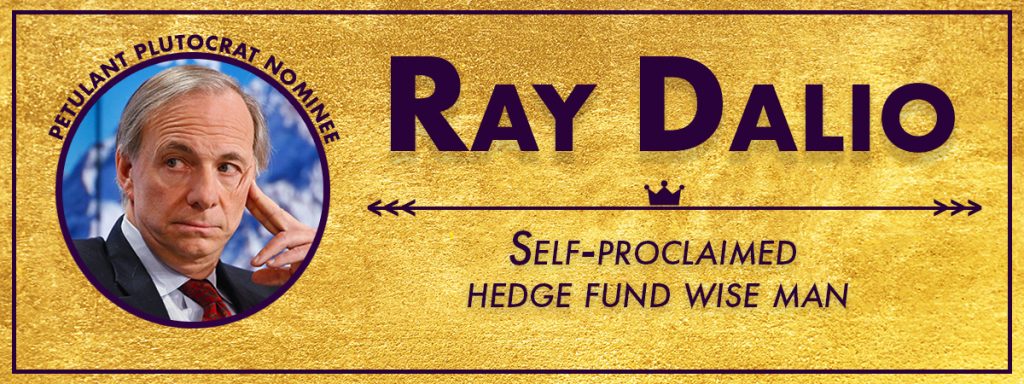
The chairman of the world’s largest hedge fund, the billionaire Ray Dalio, earlier this fall released a widely hyped new book that extols the virtues of his “radical transparency,” the workplace principles he requires all his 1,500 employees to follow. People, Dalio likes to tell reporters, need to “get past their own ego barriers” and say what they honestly think. As Dalio puts it: “Evaluate accurately, not kindly.” In the tough-love culture of Dalio’s Bridgewater Associates, all meetings get videotaped, the New York Times notes, and employees can use an app to score their co-worker arguments in real time. Dalio’s principles, critics charge, essentially “offer permission to be verbally barbaric.” One result of that barbarity: A third of Dalio’s employees leave within two years of their hire. Another: Dalio’s personal fortune, the world’s 84th largest, is now nearing $15 billion.
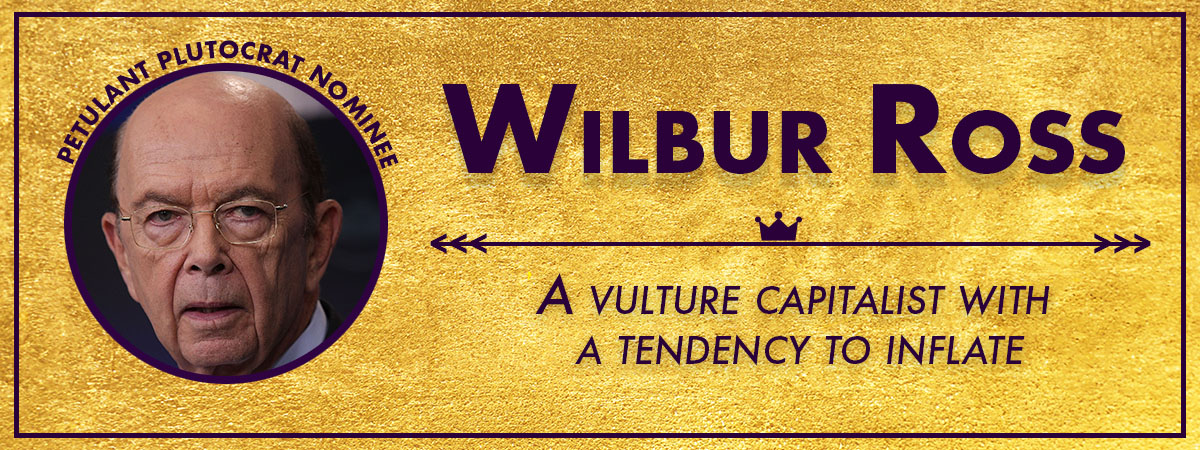
Forbes, America’s most fabled business magazine, is now charging that Donald Trump’s “billionaire” commerce secretary has been lying to researchers for the magazine’s annual list of America’s 400 richest. Commerce chief Wilbur Ross, Forbes charges, has engaged in a 13-year series of “fibs, exaggerations, omissions, fabrications, and whoppers” designed to inflate his net worth. Why lie? The richer Ross appears, the more money rich people invest in his private equity firm. Ross complained last year — when Forbes put his fortune at $2.9 billion — that the magazine was low-balling his true wealth. The magazine’s latest top 400 tally puts his net worth at just $700 million. The response from Ross? His flacks at the Commerce Department are calling any confusion about the Ross finances “unfortunate.”
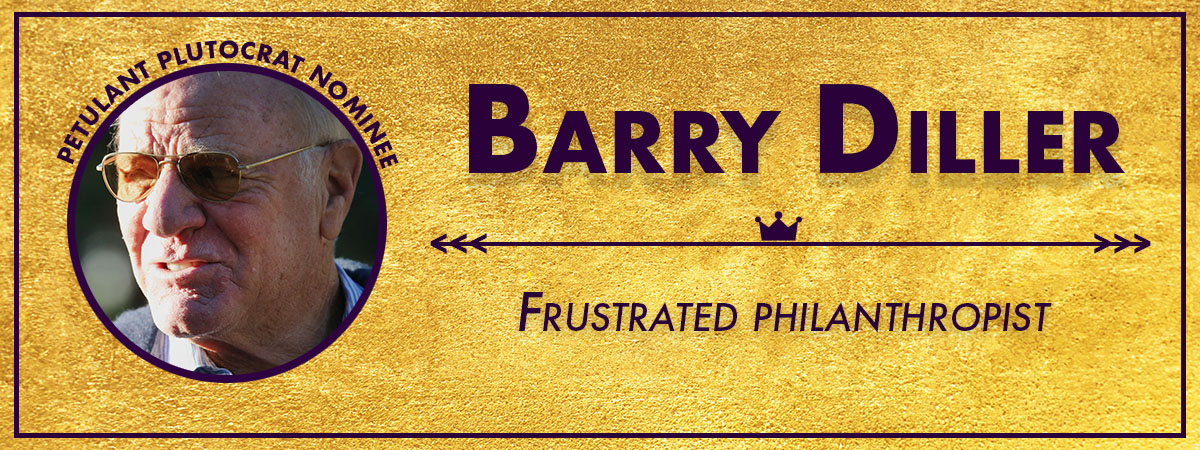
Media mogul Barry Diller is picking up his marbles and going home. The frustrated billionaire announced in September he was yanking the millions he had pledged to build a floating performance center in the Hudson River right off Manhattan’s West Side. Diller originally announced his park plan in 2014, but quickly found himself neck-deep in lawsuits over the project’s environmental impact. “A tiny group of people,” he charged, were using “the legal system to essentially drive us crazy.” But other observers like Inside Philanthropy editor David Callahan saw Diller’s park push as “part of a larger story about rising inequality and shrinking democracy.” Deciding what parks to build and where, notes Callahan, used to be “a function of democratic processes.” But today’s citizen more and more feels “like a spectator to largely privatized decision making” as a “hollowed-out public sector” lets private wealth set the agenda.
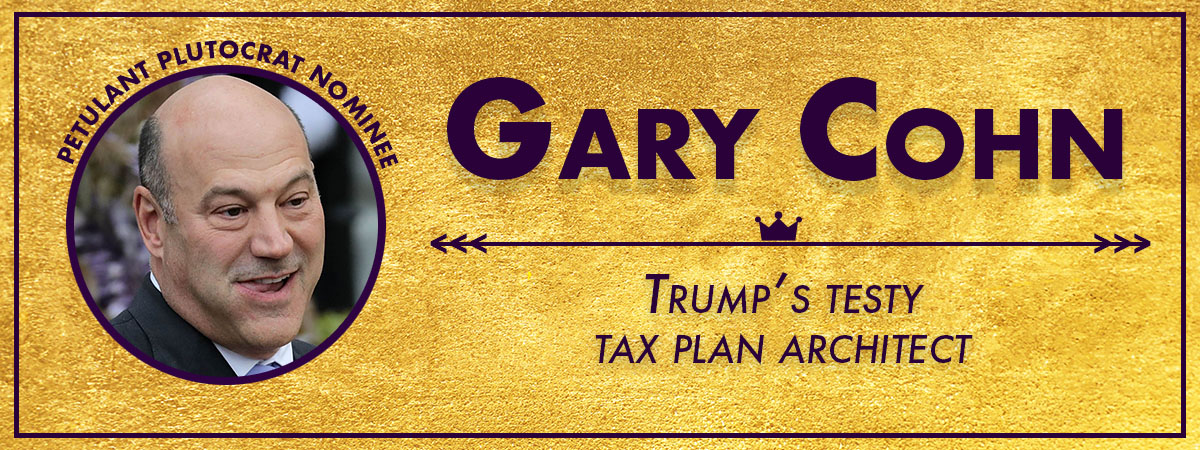
In his former job as president of Goldman Sachs, Gary Cohn is unlikely to have faced a lot of tough questioning from mere commoners. And so in a September briefing on a nine-page White House tax plan, Trump’s chief economic adviser assumed reporters would take him at his word when he promised big benefits for the middle class. When one journo dared to ask for more details to justify his claim, Cohn simply snapped back, “I told you that it would.” More recently, Cohn appeared stunned when only a few CEOs at a business leaders forum raised their hands to indicate they planned to increase job-creating investments if the GOP tax plan goes through. “Why aren’t the other hands up?” he demanded to know. Cohn, whose own net worth stands at about $266 million, clearly felt betrayed by his fellow plutocrats for exposing one of the GOP plan’s chief selling points as a total lie.

Martin Shkreli, the former pharmaceutical exec who became the face of corporate greed two years ago when he hiked the price of a life-saving drug from $13.50 to $750 a pill, is now sitting in jail — but not for price gouging. Federal prosecutors last summer convicted Shkreli for running a Ponzi-like scheme to conceal big losses in a hedge fund he ran. The defiant 34-year-old Shkreli didn’t help himself during his Brooklyn court proceedings. During jury selection, he railed against “fake news” and yawned conspicuously, reminding media observers of his smirking last year at a congressional hearing. After that hearing, Shkreli called the lawmakers who grilled him “imbeciles.” Mainstream drug companies have been trying to paint Shkreli as an industry bad apple. But they keep raising prices, too. Pfizer has this year hiked prices on 91 drugs by 20 percent.
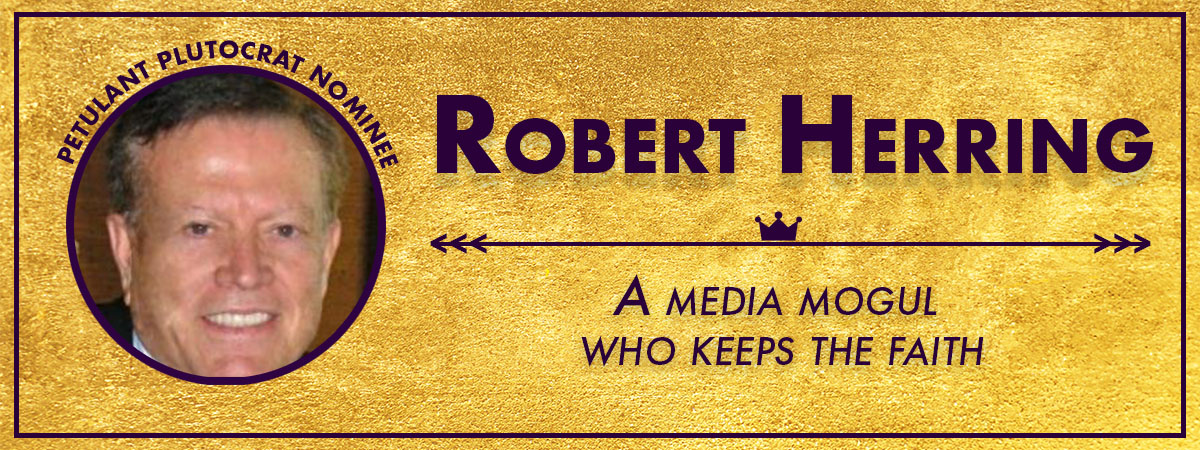
At One America News, the cable TV network that has become “one of President Trump’s favorite media outlets,” the journalists call him “Mr. H” — and would rather he never call them. That’s because “Mr. H,” aka One America News owner Robert Herring, has a nasty habit of reprimanding his people whenever they stray off the network’s hard-right line. Two years ago, one OAN journalist lost his job after he led off a newscast with an interview sympathetic to Ferguson protestors. During last year’s Presidential campaign, the mega-millionaire Herring had his network broadcast live every word of every Trump speech and “banned stories about polls that showed anyone other than Trump in the lead.” One America News now goes into 30 million homes, about a third of the Fox News reach. The Washington Post last July gave the network its first major national profile. Herring refused to comment for the story.

Billionaires don’t like to be contradicted, particularly on the public policies they’ve chosen to champion. Hedge fund manager Daniel Loeb has been championing charter schools, the controversial education “reform” that many critics see as a danger to quality free public education for all. Those critics include New York state senator Andrea Stewart-Cousins, and Loeb lashed out against her over the summer, charging that “hypocrites” like Stewart-Cousins, an African American, “do more damage to people of color than anyone who has ever donned a hood.” The resulting public revulsion against Loeb’s comments forced a quick backtrack. Noted the billionaire: “I regret the language I used in expressing my passion for educational choice.” But Loeb should be regretting even more, say education activists, his “passion” for charters, a backdoor to school privatization that has only gained political traction because billionaires like him have been so “passionate” in support.
 The ultimate let-them-eat-cake moment of 2017 may belong to Louise Linton, the third wife of mega-millionaire Steve Mnuchin, the Trump administration’s secretary of the treasury. In August, after returning from a trip to Louisville with her husband, Linton touched all the Marie-Antoinette bases. Over the course of less than 24 hours, the online social media world saw her, as one news analysis cogently sums up, “stepping off a taxpayer-funded plane, swathed head to toe in pricey couture, bragging about it, and snarking to somebody who pointed out the distastefulness of the scene by making fun of her for not being rich.” Linton has since apologized for her “highly insensitive” Instagram post. The incident, some pundits predicted, would complicate GOP plans to enact a rich people-friendly tax-cut package. It didn’t.
The ultimate let-them-eat-cake moment of 2017 may belong to Louise Linton, the third wife of mega-millionaire Steve Mnuchin, the Trump administration’s secretary of the treasury. In August, after returning from a trip to Louisville with her husband, Linton touched all the Marie-Antoinette bases. Over the course of less than 24 hours, the online social media world saw her, as one news analysis cogently sums up, “stepping off a taxpayer-funded plane, swathed head to toe in pricey couture, bragging about it, and snarking to somebody who pointed out the distastefulness of the scene by making fun of her for not being rich.” Linton has since apologized for her “highly insensitive” Instagram post. The incident, some pundits predicted, would complicate GOP plans to enact a rich people-friendly tax-cut package. It didn’t.

Betsy DeVos, the billionaire U.S. secretary of education, has spent her life surrounded by enormously rich men accustomed to getting their own way. Her father, billionaire industrialist Edgar Prince, rated as one of Michigan’s wealthiest residents. Her husband, Dick DeVos, owes his $5.3-billion fortune to Amway. This past September, in an invitation-only forum at George Mason University in Virginia, DeVos rode to the rescue of the men she claims have become the victims of Obama administration moves to protect students who report sexual assaults. Obama officials, DeVos charged, “weaponized the Office of Civil Rights” and pushed colleges to railroad young men accused of sexual assault in “kangaroo courts.” Activists supporting survivors of sexual assault rallied in protest outside the rape forum. DeVos, a spokesperson for the group End Rape on Campus pointed out, had not invited any survivor organizations to attend.
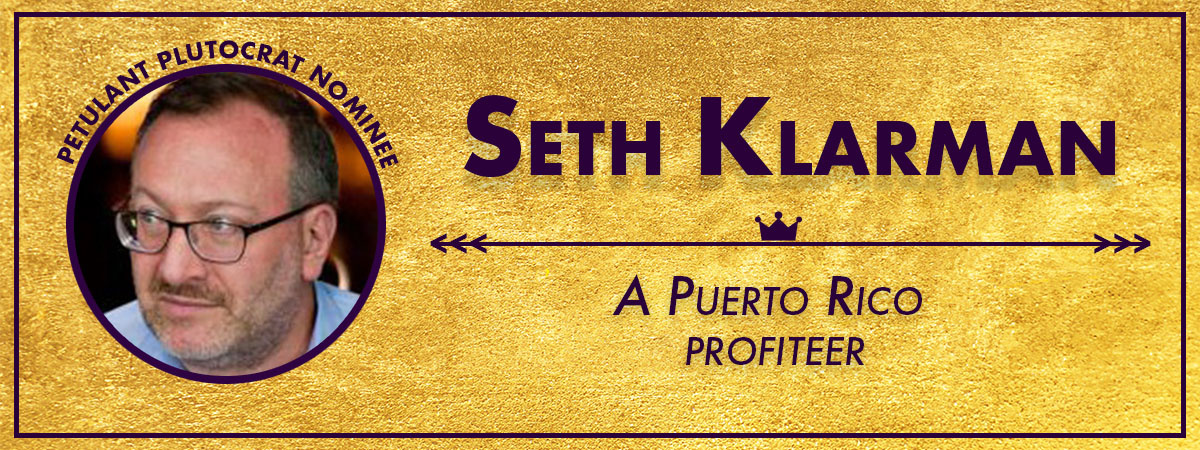
Boston hedge fund kingpin Seth Klarman has a nifty formula for making big bucks. He buys distressed assets — like the bonds of deeply indebted political jurisdictions — at a discount, then presses those jurisdictions to pay up in full. All this “investing” takes place in the shadows, concealed in the opaque filings of shell companies. In October, researchers dug through that opacity and discovered that Klarman’s hedge fund now ranks as Puerto Rico’s biggest debtholder. Since Hurricane Maria, activists have been demanding a debt forgiveness that would enable Puerto Rico to rebuild. Klarman has responded by calling any major debt forgiveness an “impractical” move that would “almost certainly eliminate any ability the Commonwealth would have to borrow money in the future at reasonable rates.” Analysts dispute that rationale for forcing Puerto Rico to privilege Wall Street. One thing no one disputes: Taking Klarman’s “advice” will balloon his already ample $1.5 billion personal fortune.
Now that you’ve read through all the nominees, cast your vote: Who should we crown as Petulant Plutocrat this year?
by Oliva Alperstein
/by Chuck Collins
/by Inequality.org
/by Helen Flannery
/by Dan Petegorsky
/by Bella DeVaan
Prominent philanthropists, national funders, and policy organizations are launching a campaign to call for common sense charity reforms.
by Inequality.org
/by Bella DeVaan
Our 2022 findings, publications, conversations, and political prospects made it clearer than ever that we need meaningful charity reform – and that a strong majority agrees.
by Inequality.org
Watch our webinar on why food banks and other nonprofits should support philanthropic policy change — and learn how you can, too.
Inequality.org
→ In Your Inbox
Get the indispensable guide to the latest on our unequal world, in your inbox every Wednesday.
You can unsubscribe any time. We do not sell or share your information with others.
Click to close
Inequality.org
→ In Your Inbox
Get the indispensable guide to the latest on our unequal world, in your inbox every Wednesday.
You can unsubscribe any time. We do not sell or share your information with others.
Click to close
Inequality.org
→ In Your Inbox
Get the indispensable guide to the latest on our unequal world, in your inbox every Wednesday.
You can unsubscribe any time. We do not sell or share your information with others.
Click to close
Inequality.org
→ In Your Inbox
Get the indispensable guide to the latest on our unequal world, in your inbox every Wednesday.
You can unsubscribe any time. We do not sell or share your information with others.
Click to close
Inequality.org
→ In Your Inbox
Get the indispensable guide to the latest on our unequal world, in your inbox every Wednesday.
You can unsubscribe any time. We do not sell or share your information with others.
Click to close